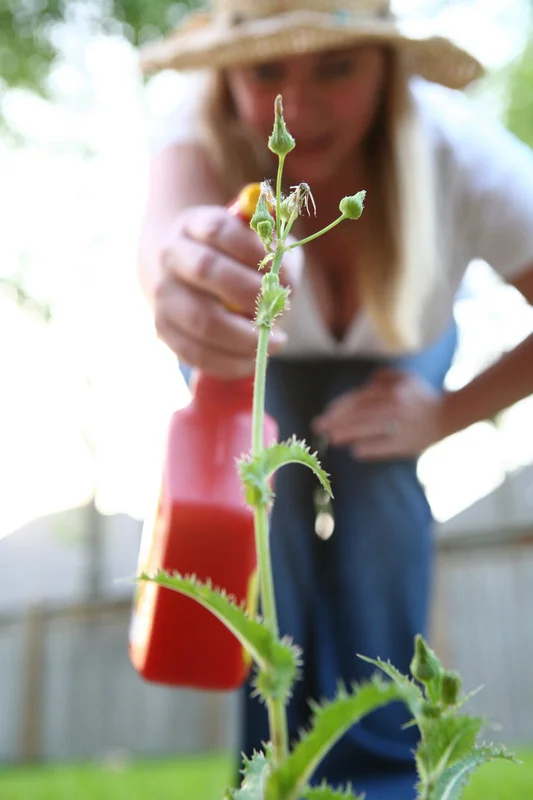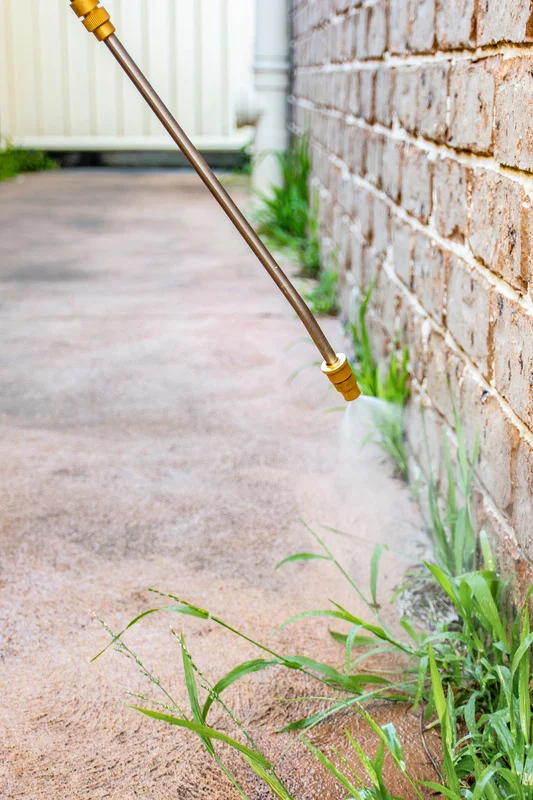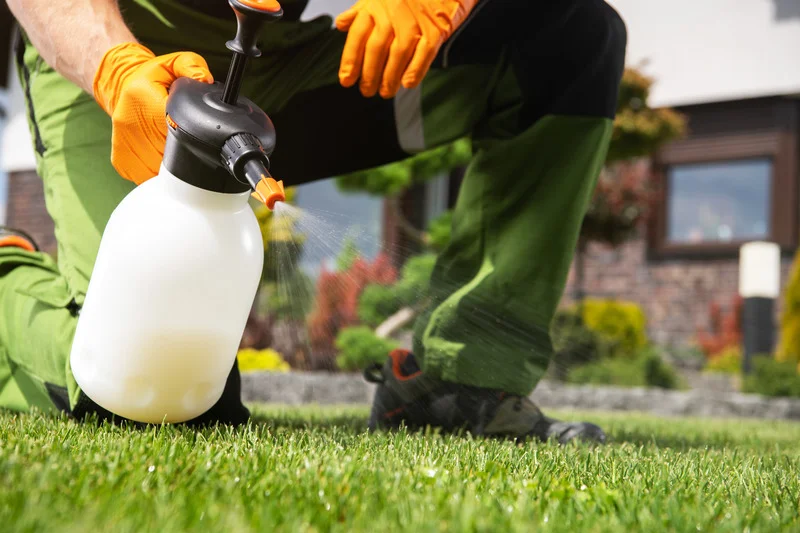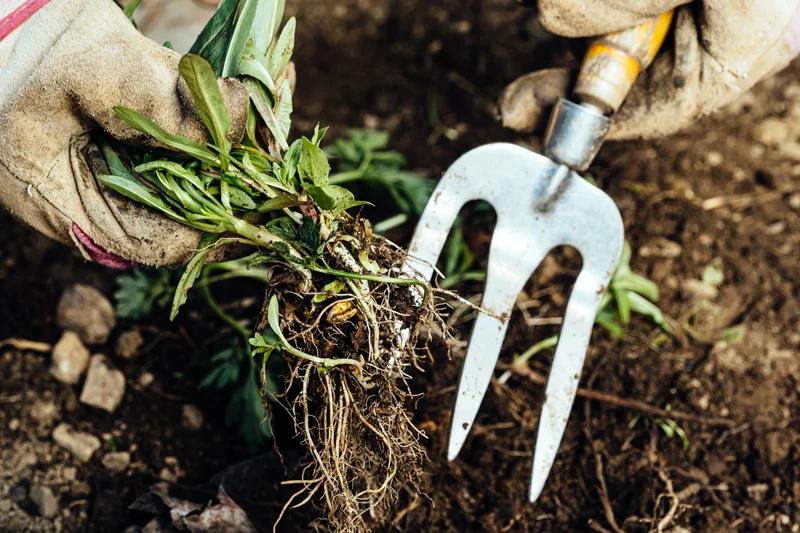Vinegar has been a household staple for ages, used for cleaning and cooking. Many choose vinegar over chemical pesticides because of its supposed safety and environmental friendliness. However, does vinegar kill grass? Though many gardeners swear by its efficacy, is it really an effective replacement for chemical herbicides? And what effects will it have on your garden or lawn?

Why People Use Vinegar On Weeds?
One natural herbicide that works is acetic acid, which is found in vinegar. Plant cells that are damaged by acetic acid release fluids and dry out the tissues. Gardeners and homeowners choose it often because it’s affordable, easily accessible, and appears to be environmentally friendly. When used properly, vinegar is quite safe for children and pets compared to chemical herbicides.
What Kind of Vinegar to Use?
According to the University of Maryland Extension, weeds with three to four leaves are likely to survive acetic acid levels between 5% and 10% (Via Jane Purnell). You’ll want to find the real deal, which is vinegar meant for horticulture that has about 20% acetic acid. If you intend to see those weeds wither and die, that is the vinegar you should be using.

How It Works?
Vinegar dehydrates the plant’s leaves and disrupts its cell membranes, therefore killing weeds. The acetic acid in vinegar operates fast to wither and kill undesired plants. However, vinegar is a non-selective herbicide, which means it can kill any plant it comes into contact with, including grass.
How to Apply Vinegar Weed Killer?
- Wear protection: Wear gloves, eye protection, and secure clothes when working with strong vinegar. Additionally, strongly advised in the event of spills and splashes is a face mask.
- Select appropriate spray: Get one gallon of white vinegar into a container. To the vinegar add one spoonful of dish soap. Stir the solution until all the components are well blended. Pour the amount you require into a garden sprayer.
- Apply on a sunny day: The acid will break down more quickly in the sun, hence it is imperative to apply the solution on a sunny day. For optimal effects, use vinegar in warm, sunny weather.
- Aim for the leaves: Avoid coming into touch with nearby grass or attractive plants by concentrating the vinegar spray on the weeds’ leaves.
- Repeat as needed: Because vinegar isn’t lasting, you may need to use it more than once to get rid of weeds that won’t go away.
- Spot treatment: Using a sponge or brush, you can apply undiluted vinegar straight to individual weeds or tiny patches.

Vinegar Does Not Get To The Root Of The Problem
While vinegar is efficient at killing weeds above ground, it fails to penetrate the soil to reach the roots. It follows that the weeds might reappear from their root systems rather fast. Long-term weed management requires either regular reapplication of vinegar or combination of vinegar with other techniques. This is remedied using salt, which will dry out and ideally destroy broadleaf weed roots.
Can You Still Use Vinegar?
No offense meant—vinegar can still be a useful tool for getting rid of weeds. It works well for spot treating little areas or for eliminating those pesky weeds that appear in the cracks in your pavement or driveway.
Still, vinegar might not be the best answer if you have a big problem with an infestation or a lawn full of weeds. And that brings us to the big question: what are the safe and effective alternatives to homemade vinegar weed killer?

Safe and Better Alternatives To Homemade Vinegar
Using vinegar, salt, and dishwashing liquid together is one of the strongest DIY weed killers. A desiccant, vinegar draws moisture from plant leaves; salt further dehydrates the plant; and washing up liquid makes the solution stick to the weeds.
Alcohol is a further great and effective method to permanently eradicate weeds from your yard. Fill a spray bottle with the mixture of two teaspoons of rubbing alcohol and one litre of water. Weeds need moisture, which the alcohol will take away.
If a more robust remedy is what you need, there are many environmentally benign, plant-based herbicides available that work well at eliminating weeds without damaging your intended plants.
Final Thoughts
That’s all there is to know about vinegar and how well it kills weeds. While it may appear to be a quick and easy remedy, the truth is that it is only a temporary repair that does not address the underlying issue.
When employing any weed control approach, remember to emphasize safety and strictly follow the directions. You may maintain weed-free garden while safeguarding the environment and your health by selecting the appropriate method and applying it sensibly.

FAQs
Vinegar is non-selective, meaning it will potentially kill every plant it comes into contact with including lawn grass and other desirable plants.
The primary danger of using vinegar as a weed killer is that it will also kill your lawn or garden plants if you’re not careful. If you spray too much vinegar on your yard, or if there is a light wind blowing when you do so, some of it might drift onto neighboring plants (including grass) and damage them as well.
A combination of vinegar, salt, and soap makes an effective homemade weed killer. This combination will kill weeds, but also any other vegetation it touches, so use it carefully. The solution can also change the acidity of your soil, so it’s best for sidewalks and patios.
Though grass will turn yellow after being sprayed with household vinegar, it will typically only harm the individual blades, leaving the roots unaffected. After about a week, new blades of grass will grow back; however, if your grass is only a few weeks old, it will kill it.
Sources:
- How to Use Vinegar to Kill Weeds on Walkways and Driveways
- Dangers Of Vinegar As Weed Killer
- Don’t use Vinegar as a Weed Killer: Here’s Why?
- What Does Vinegar Do To Your Grass?
- Vinegar as a Weed Killer: You’re Probably Doing It Wrong
- Horticultural vinegar to kill lawn for reno
- Vinegar as weed killer questions
- How to Make Yard Maintenance and Yard Waste Clean Up More Manageable
- Using Vinegar to Kill Weeds in the Lawn and Garden
- Ditch the RoundUp : Good-bye Weeds & Grass with Vinegar!
- Solved! Does Vinegar Kill Weeds?
- Applying Vinegar to kill weeds How long will it take for lawn to be fertile again?
- Will Vinegar Kill Grass And Other Lawn Care Ideas
- How to Use a Homemade Weed Killer With Vinegar
- Does Vinegar Kill Weeds?
- 5 Tips for Using Vinegar Weed Killer